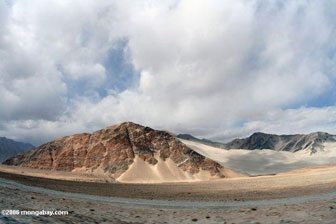Air pollution can reduce rainfall
Air pollution can reduce rainfall
mongabay.com
March 8, 2007
Air pollution can reduce rainfall in mountainous areas according to research published in Friday’s issue of the journal Science.
50 years of measurements at Mt. Hua near Xi’an, in central China, show that precipitation levels can be decreased by 30 to 50 percent during hazy conditions. The researchers say this is the result of high concentrations of particulates in the air which cause cloud droplets to be smaller and less likely to become raindrops.
The work suggests that such pollution may be contributing to drought conditions in other parts of the world, including “western U.S. mountain ranges that are downwind from polluted urban areas.”

Western China. Photo by Rhett A. Butler |
Lead author Daniel Rosenfeld of the Institute of Earth Sciences at The Hebrew University of Jerusalem teamed with six Chinese scientific: Jin Dai, Xing Yu, Zhanyu Yao, Xiaohong Xu, Xing Yang, and Chuanli Du.
Related articles
Asian pollution causes stronger thunderstorms, may worsen global warming. Growing levels of pollution in Asia are altering the chemistry of the atmosphere and causing a change in Pacific storm patterns according to researchers writing in the online early edition of PNAS
China misses pollution targets. China’s environmental protection agency said that the country failed to meet any of its 2006 pollution control goals according to its web site. The State Environmental Protection (SEPA) admitted that economic growth actually caused the country to fall well behind its environmental targets.
Air pollution may reduce wind power, rainfall. Aerosolized particles and other pollution produced from vehicle exhaust may reduce wind speeds near Earth’s surface, resulting in less wind for power generation as well as reduced precipitation, according to a study published in the December 27th online edition of Geophysical Research Letters by researchers at Stanford University and NASA.
Smoke from forest fires reduces rainfall and spells trouble for the Amazon rainforest. Recent studies by NASA scientists have found that heavy smoke from Amazon forest fires inhibits cloud formation and reduces rainfall. This finding, combined with other NASA studies suggesting that deforestation can affect regional climate, means that the Amazon rainforest may be on the verge of a significant environmental transformation.














